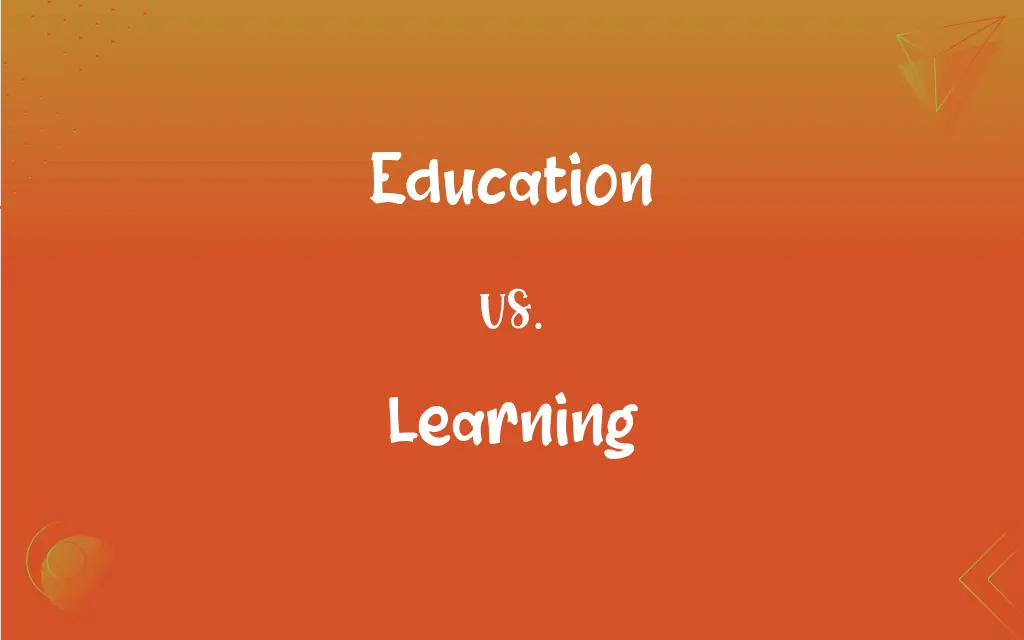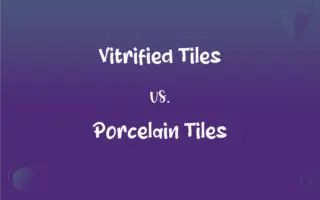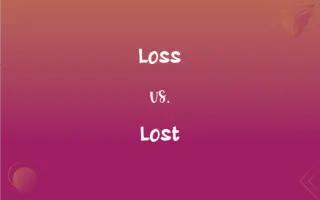Education vs. Learning: What's the Difference?
Edited by Janet White || By Harlon Moss || Updated on October 23, 2023
Education is the systematic process of teaching and training; learning is the individual acquisition of knowledge or skills.

Key Differences
Education typically implies a structured and organized process designed to impart knowledge or skills, often provided by institutions. On the other hand, learning is a broader, self-driven process where an individual acquires knowledge or a new skill.
While education often follows a predetermined curriculum and is overseen by instructors or institutions, learning can occur spontaneously and can be prompted by curiosity, necessity, or interest.
Education often involves formal settings like schools, colleges, or training centers. In contrast, learning can take place anywhere and anytime, from reading a book at home to watching a documentary or experiencing something new.
Education can be seen as a pathway, designed by educators, that guides learners through specific content. However, learning is the act of walking that path, where the individual internalizes the information.
In essence, education provides the opportunity and environment, but learning is the active engagement and understanding that an individual achieves, be it through formal education or personal experiences.
ADVERTISEMENT
Comparison Chart
Nature
Structured and organized.
Self-driven and spontaneous.
Setting
Often formal like schools and colleges.
Can be anywhere, anytime.
Initiator
Typically delivered by educators or institutions.
Initiated by the individual.
Outcome
Achieving a set standard or qualification.
Acquisition of knowledge or skills, with or without certification.
Dependency
Relies on curriculum and instruction.
Relies on personal experience, curiosity, or necessity.
ADVERTISEMENT
Education and Learning Definitions
Education
The knowledge or training acquired through this process.
Her education in medicine prepared her for the pandemic.
Learning
The process of becoming altered or modified over time.
The learning curve for the new software was steep.
Education
The field of study concerned with teaching and learning.
He dedicated his life to education reforms.
Learning
Knowledge acquired through study or experience.
Her vast learning was evident in her discussions.
Education
The process of receiving systematic instruction, especially in a school or college.
An education in classical languages is still valuable today.
Learning
The acquisition of knowledge or skills through experience or study.
Learning a new language takes time and patience.
Education
A program of instruction in a particular subject.
The government introduced a new education initiative for science and technology.
Learning
The cognitive process of acquiring skill or knowledge.
Active engagement enhances learning in students.
Education
An enlightening experience or awareness.
Traveling the world provides an education in cultural diversity.
Learning
An alteration in state or function that constitutes the behavioral outcome.
Through positive reinforcement, learning can be enhanced.
Education
The act or process of educating or being educated.
Learning
The act, process, or experience of gaining knowledge or skill.
FAQs
Can learning occur without formal education?
Yes, learning can happen through experiences, self-study, or curiosity.
Can education be self-directed?
While education often has a structured approach, self-education is a form of directed self-learning.
How do modern technologies impact learning and education?
They provide varied platforms for education and enhance self-directed learning opportunities.
What's the primary difference between education and learning?
Education is a structured teaching process; learning is an individual's knowledge acquisition.
Can one stop learning?
While formal education might end, learning is a lifelong process.
Why is lifelong learning essential?
Lifelong learning ensures adaptability, skill development, and personal growth.
Can experiences be a form of education?
Absolutely. Experiential learning is education derived from personal experiences.
How do personal interests influence learning?
Interests can drive motivation and engagement, enhancing the learning process.
Why is a varied educational approach important?
Because learners have diverse needs, and a varied approach caters to these differences.
Is all education successful in prompting learning?
Not always. Successful education facilitates learning, but it depends on the individual's engagement.
What's the role of a teacher in education and learning?
In education, they instruct and guide; in learning, they facilitate and inspire.
Can one be educated and yet not have much formal learning?
Yes, education can be derived from experiences, not just formal instruction.
Is memorization the same as learning?
Not necessarily. Learning involves understanding, while memorization can be surface-level.
Can failures be a part of the learning process?
Absolutely. Failures often provide valuable lessons and insights.
How can one maximize their learning in an educational setting?
By being actively engaged, asking questions, and seeking practical applications of knowledge.
Is there a "best" style of education?
Education styles vary and what's best often depends on individual learner needs.
How are online courses changing the landscape of education and learning?
They're democratizing education access and supporting self-paced learning.
How are curriculums decided in education?
Often by educational boards or institutions, based on societal needs and academic standards.
Is informal learning less valuable than formal education?
Both have value. Informal learning can often provide practical, real-world knowledge.
What's the role of feedback in education and learning?
In education, it guides improvement; in learning, it informs understanding.
About Author
Written by
Harlon MossHarlon is a seasoned quality moderator and accomplished content writer for Difference Wiki. An alumnus of the prestigious University of California, he earned his degree in Computer Science. Leveraging his academic background, Harlon brings a meticulous and informed perspective to his work, ensuring content accuracy and excellence.
Edited by
Janet WhiteJanet White has been an esteemed writer and blogger for Difference Wiki. Holding a Master's degree in Science and Medical Journalism from the prestigious Boston University, she has consistently demonstrated her expertise and passion for her field. When she's not immersed in her work, Janet relishes her time exercising, delving into a good book, and cherishing moments with friends and family.
































































